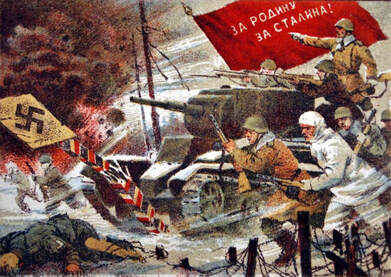 The Siege of Leningrad inspired Shostakovich's mighty Seventh Symphony The Siege of Leningrad inspired Shostakovich's mighty Seventh Symphony The mix of music and politics in the twentieth century got off to a blistering start with the première of Puccini’s Tosca in January 1900. Its turbulent background of politics and violence in 1800 Rome is a constant presence. The opera itself was the victim of political disturbances when a bomb threat delayed its première in Rome by a day. However, unlike the works and composers discussed in Part 1: 1700 – 1900 (see 16/3/2022 below), Puccini was far less interested in the politics than in the potential of his ‘shabby little shocker’ (as one reviewer called it) for theatrical melodrama. Even so, the issue of ‘Politics in Music’ is directly addressed in the opera’s Act II aria Vissi d’Arte (“I’ve Lived for Art”) in which Tosca, an opera singer, argues that she’s given her life to Art and to God, so why is He punishing her with all this blackmail, lechery and politics. Nor are Richard Strauss’s two one-act operas Salome (1905) and Elektra (1909) without political implications, although Strauss, like Puccini, was far more interested in their theatrical potential than their politics. Ironically, Strauss’s lack of direct interest in politics was the very cause of his political predicament during the Third Reich and after WWII. Strauss used his influence, as Germany’s most prominent composer, wherever possible to improve copyright law and the financial position of German musicians and composers; something that initially led him to support the Third Reich because of its support for cultural institutions. Despite remaining on generally good terms with the Nazi Party, Strauss resisted moves to blacklist Jewish musicians and was exonerated of any ties to the Nazi State during his denazification trial. The need to remedy what the Nazis believed to be the degeneration of German music resulted in a ‘cleansing’ – partly racial, partly stylistic – which affected numerous living German composers as well as attitudes to several who were long dead, particularly Mendelssohn and Mahler. Of the living, several left the country in the turbulent anti-Jewish 1930s – including Berthold Goldschmidt, Kurt Weill and Arnold Schoenberg, but many other Jewish composers such as Erwin Schulhoff and Pavel Haas, didn’t manage to escape the Holocaust and their surviving music became increasingly familiar as the century progressed. Paul Hindemith, was initially very much in political favour during the Third Reich, but by 1935 his music was suppressed. The anti-fascist political message of his opera Mathis der Maler was all too clear to the Nazis, with a plot that describes the painter Matthias Grünewald’s struggle for artistic freedom of expression during the repressive climate of the German Peasants’ War in the early sixteenth century. But the Nazis chose and promoted their own musical heroes and Hitler’s fixation with Richard Wagner’s music, ideology and personal characteristics is well-known. By association, Wagner came to represent the ideals of Naziism, a stigma that still remains to a degree, especially in the widespread public opposition to performances of his music in Israel, although the composer died almost half a century before the rise of the National Socialists. But Hitler distorted Wagner’s ideology to suit his own, just as hundreds of opera directors have done since the composer’s death. Hitler did the same with Shakespeare’s The Merchant of Venice which, unlike anything in Wagner’s musical works, is quite specific in its characterisation of the Jew, Shylock, as a villain. On his website, Israeli pianist and leading Wagner conductor Daniel Barenboim gives a very well-considered and penetrating summary of the anti-Wagner issue in Israel – but more on that in Part 3. If there is a single composer who can be identified as the leading exponent of the connection between music and politics, it’s surely Dmitri Shostakovich. Unlike almost every other Soviet Russian composer of real note among his contemporaries, Shostakovich remained a Russian resident throughout his life, while Stravinsky (before) and Rachmaninov (after) the 1917 Revolution, moved to Europe and then the USA. Although Prokofiev also left, returning in 1935, Shostakovich never considered leaving his homeland. The youthful exuberance of Shostakovich’s First Symphony gave way to the state-commissioned Soviet propaganda of the Second and Third. The primal suffocating scream that opens the Fourth leads to an explosive, almost traumatic outpouring in an epic symphony which was withheld by the composer for twenty-five years for fear of retribution, followed by the ironic triumph of the Fifth. In the 1940s, Shostakovich’s experience of oppression from all sides was openly expressed in his chilling and turbulent ‘war’ symphonies – The Leningrad (Seventh) written in that city during its siege by the Nazis, followed by the grief-stricken despair of the Eighth with its jack-booted third movement, and the crushing (both physically and mentally) totalitarian Adagio section of its Finale. In England, Vaughan Williams’ Pastoral Symphony, unlike its Beethoven namesake, takes no delight in the beauty of the countryside, but, rather, laments the fallen WWI soldiers who now lie beneath the battlefields of Europe. And his Sixth Symphony’s violent and disturbing character is widely thought to express the composer’s reaction to the deployment of the atomic bombs on Hiroshima and Nagasaki. Even Vaughan Williams’ popular The Lark Ascending, begun before the war as an English county idyll, ended, in its 1920 orchestral form, as an elegy for a lost world and lost lives. In 1943 Michael Tippet was imprisoned for his refusal to undertake even non-combatant war-related duties during WWII. However, his Oratorio A Child of Our Time expresses his reaction to the Nazi’s violent pogrom against Jews, although its inclusion of African-American spirituals protests against all forms of oppression, including his own imprisonment, and also underlines the subversive political motivation of the spirituals themselves. Benjamin Britten’s political beliefs are well-known, particularly his total commitment to pacifism and the futility of War. His War Requiem, juxtaposing the text of the Latin mass with poems by Wilfred Owen, is among his finest works. And Britten’s 1970 opera Owen Wingrave further debates the morality of war; its subject was deliberately chosen as a protest against the Vietnam war. The musical protests of that time in popular music should also not be forgotten. Bob Dylan, Janis Joplin, Pete Seeger and Joan Baez were among many singers and songwriters whose music had a profound effect on changing attitudes to war. Others, including John Lennon (Give Peace a Chance; Imagine) continued the anti-violence message which was taken up by many others in the last decades of the twentieth century. Sadly, their legacy seems to have wilted in the twenty-first century as, once again, aggression is seen as a valid means of repressing opposing ideologies. Polish composer Krzysztof Penderecki’s 1961 string orchestra piece, originally titled 8’37”, was intended as an exploration of new sonorities as the composer developed his very personal musical language. After hearing the work performed, Penderecki became aware of its intense emotional charge and renamed it Threnody to the Victims of Hiroshima. Then, in 1992, another Polish composer, Henryk Górecki, shot to fame when a new recording of his fifteen-year-old Symphony No. 3 – Symphony of Sorrowful Songs beat all sales records for a recording of symphonic music. The symphony comprises three ‘laments’ which reflect on the Holocaust, and particularly on the lives that were lost in the camps that were established by the Gestapo in the composer’s homeland. Finally, the contemporary American minimalist John Adams’ music is full of political content. Among his many politically motivated works, three of his operas stand out for their radical reactions to relatively recent major historical events. Nixon in China (1987) analyses how mythology can be created through propaganda and accepted as truth; The Death of Klinghoffer (1991) remains Adams’ most controversial work and still draws misguided accusations of “catering to anti-American, anti-Semitic and anti-bourgeois prejudices”, as well as being subjected to public protests every time it’s revived; and Doctor Atomic (2005) focuses on the extreme anxiety and stress of those involved in the lead-up to the testing of the first atomic bomb in 1945. These examples of politics in music are by no means exhaustive, but they are proof enough against those who might suggest that politics has no place in music. Any such glib claim runs counter to the inherent artistic expression in music and other artforms.
0 Comments
|
AuthorTony Ryan has reviewed Christchurch concerts, opera and music theatre productions and many other theatre performances since the mid 1990s. ReviewsTony has presented live and written radio reviews of numerous concerts, opera and other musical events for RNZ Concert for many years. An archive of these reviews can be found at Radio New Zealand - Upbeat
His reviews of opera, music & straight theatre and numerous reviews of buskers and comedy festival performances are available at Theatreview. An archive of Tony’s chamber music reviews is held at Christopher’s Classics He has also reviewed for The Press (Christchurch). Links to Tony's Press reviews are listed below: 2024 Songs for Helen – Music by Chris Adams 2022 A Barber and Bernstein Double Bill – Toi Toi Opera The Strangest of Angels – NZOpera Will King (Baritone) and David Codd (Piano) – Christopher's Classics 2019 Ars Acustica – Free Theatre Truly Madly Baroque – Red Priest The Mousetrap – Lunchbox Theatre Iconoclasts – cLoud Last Night of the Proms – CSO 2018 An Evening with Simon O’Neill NZSO Catch Me If You Can – Blackboard Theatre Brothers in Arms – CSO Fear and Courage – CSO Sin City – CSO Don Giovanni – Narropera at Lansdowne Mad Hatter’s Tea Party – Funatorium Weave – NZTrio Tosca – NZ Opera 2017 Sister Act – Showbiz Broadway to West End – Theatre Royal Chicago – Court Theatre Tchaikovsky Symphony No. 5 – CSO Homage – CSO Last Night of the Proms – CSO SOAR – NZTrio Pianomania – NZSO Rogers & Hammerstein – Showbiz Songs for Nobodies – Ali Harper The Beauty of Baroque – CSO Travels in Italy – NZSO Archives
February 2024
Categories |

 RSS Feed
RSS Feed
